什么是TCP粘包/拆包
首先要明确, 粘包问题中的 “包”, 是指应用层的数据包.在TCP的协议头中, 没有如同UDP一样的 “报文长度” 字段,但是有一个序号字段.
站在传输层的角度, TCP是一个一个报文传过来的. 按照序号排好序放在缓冲区中.
站在应用层的角度, 看到的只是一串连续的字节数据.那么应用程序看到了这一连串的字节数据, 就不知道从哪个部分开始到哪个部分是一个完整的应用层数据包.此时数据之间就没有了边界, 就产生了粘包问题,那么如何避免粘包问题呢?归根结底就是一句话, 明确两个包之间的边界
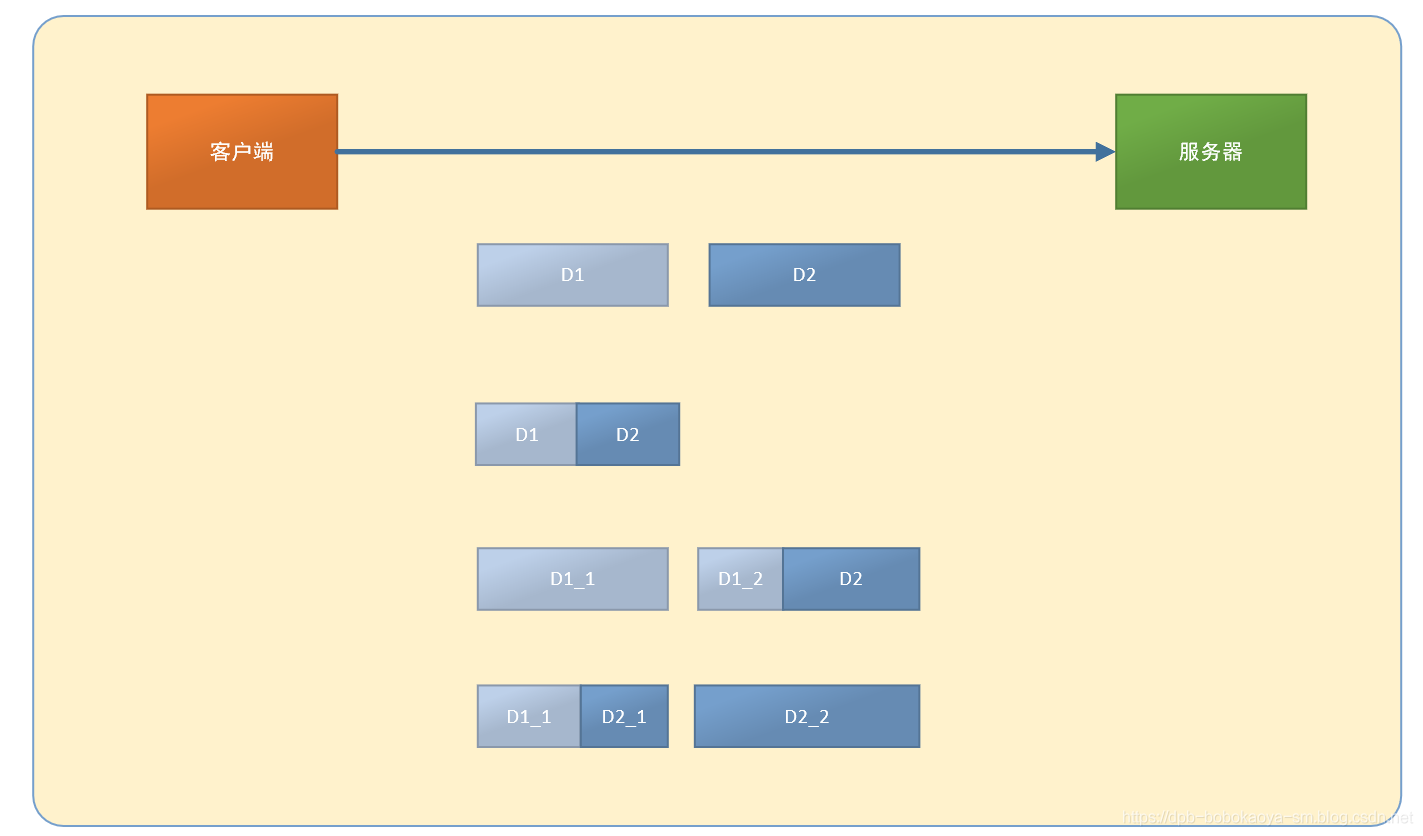
如图所示,假设客户端分别发送两个数据包D1和D2给服务器端,由于服务器端一次读取到的字节数是不确定的,所以可能存在以下几种情况:
- 服务端分两次读取到了两个独立的数据包,分别是D1和D2,这种情况没有粘包和拆包
- 服务端一次接收到了两个数据包,D1和D2粘合在一起,被称为TCP粘包
- 服务端分两次读取到了两个数据包,第一次读取到了完整的D2包和D1包的部分内容,第二次读取到了D1包剩余的内容,这被称为TCP拆包
- 和第3中情况相反,也是拆包
- 如果服务端的TCP接收滑窗非常小,而数据包D1和D2比较大,那么服务器要分多次才能将D1和D2完全接收完,期间发生了多次拆包
未考虑TCP粘包案例
上面我们介绍了TCP粘包和拆包的原因,现在我们通过Netty案例来实现下不考虑TCP粘包和拆包问题而造成的影响。代码如下
服务端代码
服务端每读取到一条消息,就计数一次,然后发送应答消息给客户端,按照设计,服务端接受到的消息总数应该跟客户端发送消息总数相同,而且请求消息删除回车换行符后应该为"Query time order".
package com.dpb.netty.demo1;
import io.netty.bootstrap.ServerBootstrap;
import io.netty.channel.ChannelFuture;
import io.netty.channel.ChannelInitializer;
import io.netty.channel.ChannelOption;
import io.netty.channel.nio.NioEventLoopGroup;
import io.netty.channel.socket.SocketChannel;
import io.netty.channel.socket.nio.NioServerSocketChannel;
import io.netty.handler.codec.LineBasedFrameDecoder;
import io.netty.handler.codec.string.StringDecoder;
public class TimerServer {
public void bind(int port) throws Exception{
// 配置服务端的NIO线程组
// 服务端接受客户端的连接
NioEventLoopGroup bossGroup = new NioEventLoopGroup();
// 进行SocketChannel的网络读写
NioEventLoopGroup workerGroup = new NioEventLoopGroup();
try {
// 用于启动NIO服务端的辅助启动类,目的是降低服务端的开发复杂度
ServerBootstrap b = new ServerBootstrap();
b.group(bossGroup,workerGroup)
// 设置Channel
.channel(NioServerSocketChannel.class)
// 设置TCP参数
.option(ChannelOption.SO_BACKLOG, 1024)
// 绑定I/O事件的处理类ChildChannelHandler
.childHandler(new ChildChannelHandler());
// 绑定端口,同步等待成功
ChannelFuture f = b.bind(port).sync();
// 等待服务端监听端口关闭
f.channel().closeFuture().sync();
} finally {
// 优雅退出,释放线程池资源
bossGroup.shutdownGracefully();
workerGroup.shutdownGracefully();
}
}
private class ChildChannelHandler extends ChannelInitializer<SocketChannel>{
protected void initChannel(SocketChannel arg0) throws Exception {
arg0.pipeline().addLast(new TimerServerHandler());
}
}
public static void main(String[] args) throws Exception {
int port = 8080;
new TimerServer().bind(port);
}
}package com.dpb.netty.demo1;
import java.nio.ByteBuffer;
import io.netty.buffer.ByteBuf;
import io.netty.buffer.Unpooled;
import io.netty.channel.ChannelHandlerAdapter;
import io.netty.channel.ChannelHandlerContext;
/**
* 用于对网络事件进行读写操作
* @author 波波烤鸭
* @email dengpbs@163.com
*
*/
public class TimerServerHandler extends ChannelHandlerAdapter{
private int counter;
public void channelRead(ChannelHandlerContext ctx, Object msg) throws Exception {
// ByteBuf 类似于NIO中的java.nio.ByteBuffer对象,
ByteBuf buf = (ByteBuf) msg;
byte[] req = new byte[buf.readableBytes()];
buf.readBytes(req);
String body = new String(req,"utf-8")
.substring(0,req.length-System.getProperty("line.separator").length());
System.out.println("The time server receive order : "+body+",counter is:"+ ++counter);
String currentTime = "Query time order".equalsIgnoreCase(body)?new java.util.Date(System.currentTimeMillis()).toString():"BAD ORDER";
ByteBuf resp = Unpooled.copiedBuffer(currentTime.getBytes());
ctx.writeAndFlush(resp);
}
public void channelReadComplete(ChannelHandlerContext ctx) throws Exception {
// TODO Auto-generated method stub
ctx.flush();
}
public void exceptionCaught(ChannelHandlerContext ctx, Throwable cause) throws Exception {
// TODO Auto-generated method stub
ctx.close();
}
}客户端代码
客户端跟服务器连接建立成功后,循环发送100条消息,每发送一条就刷新一次,保证每条消息都会被写入Channel中,按照设计,服务端应该接收到100条查询时间指令的请求消息,客户端每接收到服务端一条应答消息后,就打印一次计数器,按照设计客户端应该打印100次服务端的系统时间。
package com.dpb.netty.demo1;
import io.netty.bootstrap.Bootstrap;
import io.netty.channel.ChannelFuture;
import io.netty.channel.ChannelInitializer;
import io.netty.channel.ChannelOption;
import io.netty.channel.EventLoopGroup;
import io.netty.channel.nio.NioEventLoopGroup;
import io.netty.channel.socket.SocketChannel;
import io.netty.channel.socket.nio.NioSocketChannel;
public class TimeClient {
public static void main(String[] args) throws Exception {
int port = 8080;
new TimeClient().connect(port, "127.0.0.1");
}
public void connect(int port,String host)throws Exception{
// 配置客户端NIO线程组
EventLoopGroup group = new NioEventLoopGroup();
try{
Bootstrap b = new Bootstrap();
b.group(group).channel(NioSocketChannel.class)
.option(ChannelOption.TCP_NODELAY, true)
.handler(new ChannelInitializer<SocketChannel>() {
protected void initChannel(SocketChannel arg0) throws Exception {
arg0.pipeline().addLast(new TimeClientHandler());
}
});
// 发起异步连接操作
ChannelFuture f = b.connect(host,port).sync();
// 等待客户端链路关闭
f.channel().closeFuture().sync();
}catch(Exception e){
e.printStackTrace();
}finally{
// 优雅退出,释放NIO线程组
group.shutdownGracefully();
}
}
}package com.dpb.netty.demo1;
import java.util.logging.Logger;
import io.netty.buffer.ByteBuf;
import io.netty.buffer.Unpooled;
import io.netty.channel.ChannelHandlerAdapter;
import io.netty.channel.ChannelHandlerContext;
public class TimeClientHandler extends ChannelHandlerAdapter{
private static final Logger logger = Logger.getLogger(TimeClientHandler.class.getName());
private int counter;
private byte[] req;
public TimeClientHandler(){
// 客户端每次发送的消息后面都跟了一个换行符
req = ("Query time order"+System.getProperty("line.separator")).getBytes();
}
public void channelActive(ChannelHandlerContext ctx) throws Exception {
ByteBuf message = null;
for(int i =0;i < 100 ; i++){
message = Unpooled.buffer(req.length);
message.writeBytes(req);
ctx.writeAndFlush(message);
}
}
public void channelRead(ChannelHandlerContext ctx, Object msg) throws Exception {
ByteBuf buf = (ByteBuf) msg;
byte[] req = new byte[buf.readableBytes()];
buf.readBytes(req);
String body = new String(req,"UTF-8");
System.out.println("Now is :"+body+";counter is :"+ ++counter);
}
public void exceptionCaught(ChannelHandlerContext ctx, Throwable cause) throws Exception {
// TODO Auto-generated method stub
logger.warning("Unexpected exception from downstream:"+cause.getMessage());
ctx.close();
}
}测试结果
服务端输出结果:
The time server receive order : Query time order
Query time order
... 省略55
Query time ord,counter is:1
The time server receive order :
Query time order
... 省略41
Query time order,counter is:2客户端输出结果
Now is :BAD ORDERBAD BAD ORDERBAD ;counter is :1服务端的运行结果表明它只接受到了两条消息,第一条包含57个"Query time order"指令,第二条包含43条"Query time order"指令,总数刚好是100条,我们期待服务器会接收到100次,结果只接受到了两次,说明发送了TCP粘包。而客户端设计应该受到100条响应,实际服务器发送了两次响应,客户端只受到了一条响应,说明服务器返回给客户端的应答信息也发生了粘包问题。
Netty解决TCP粘包
为了解决TCP粘包/拆包导致的半包读写问题,Netty默认提供了多种编解码器用于处理半包,此处我们使用LineBasedFrameDecoder来解决,实现如下
服务端修改


客户端修改
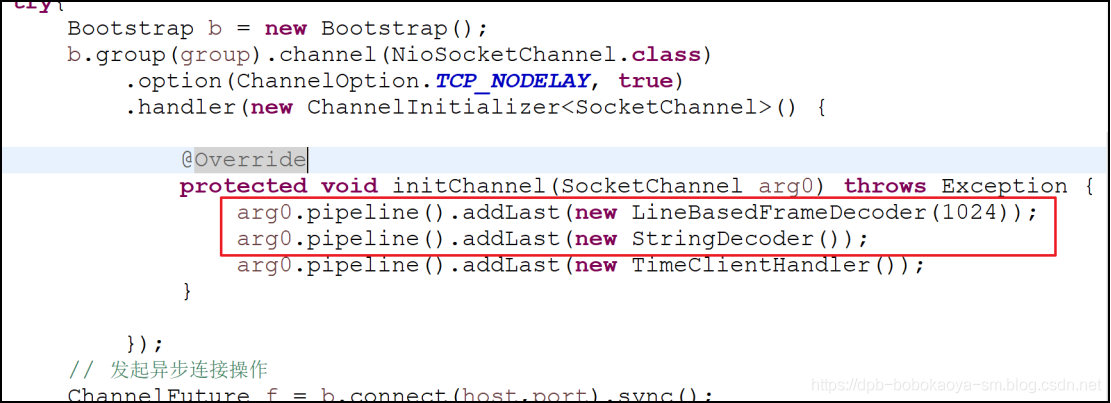
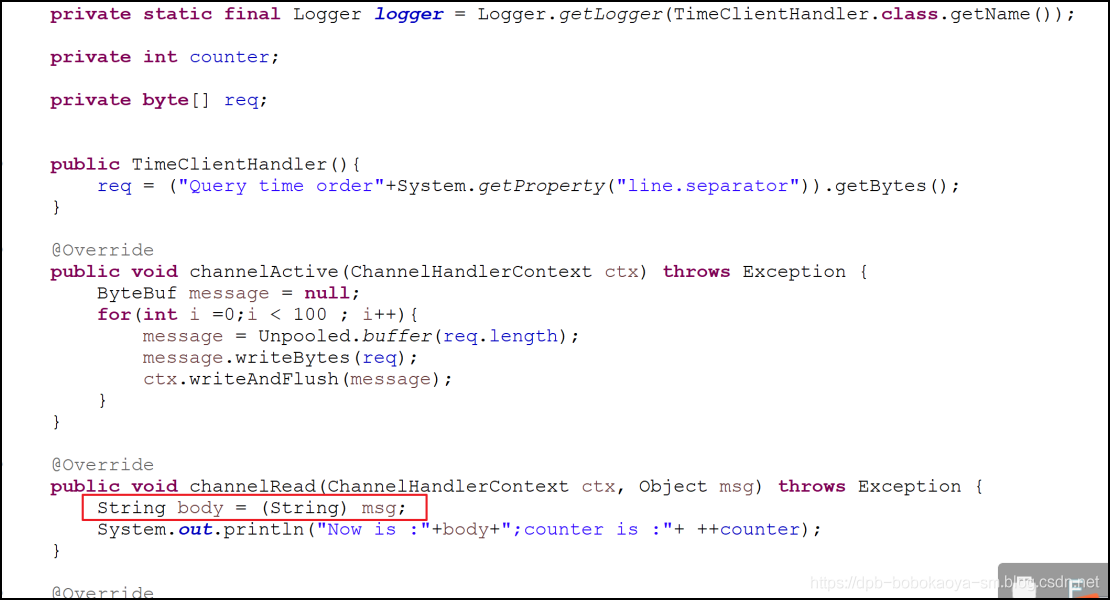
测试结果
服务端输出
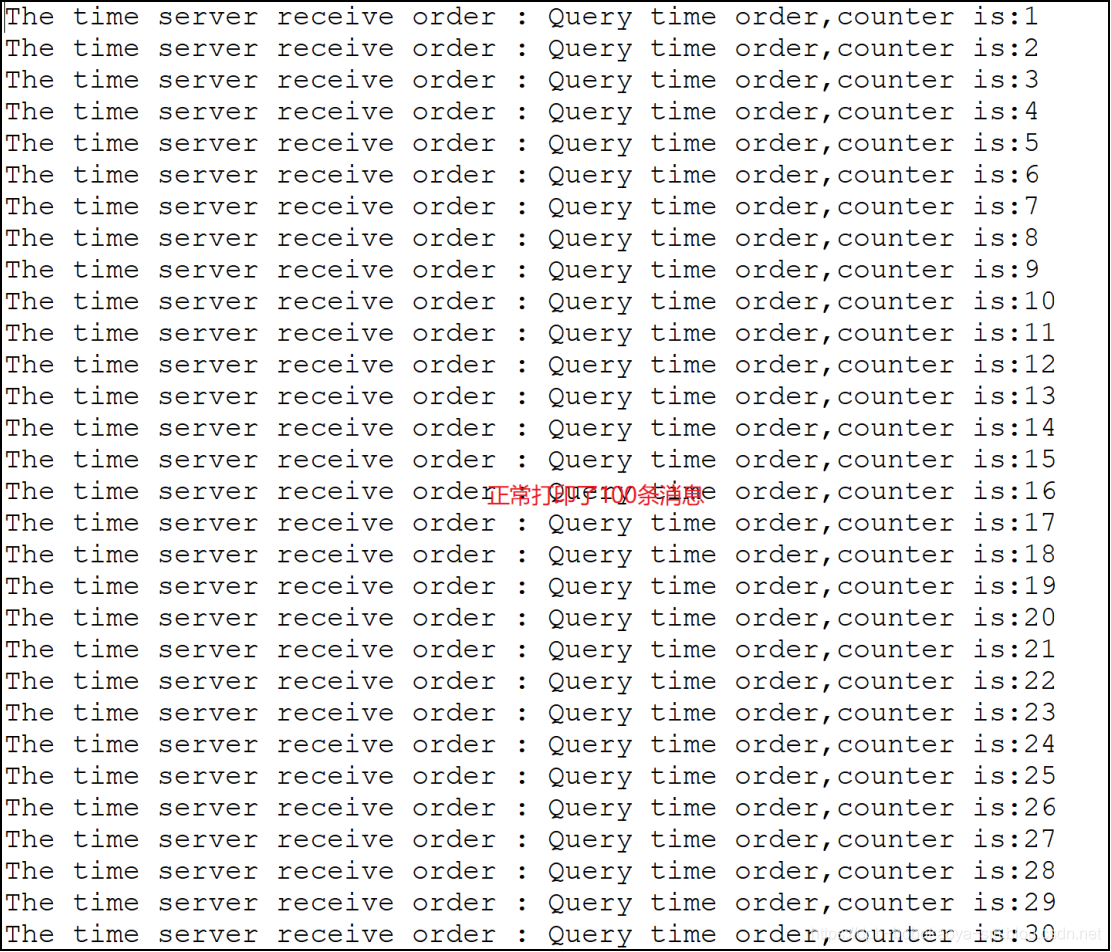
客户端输出
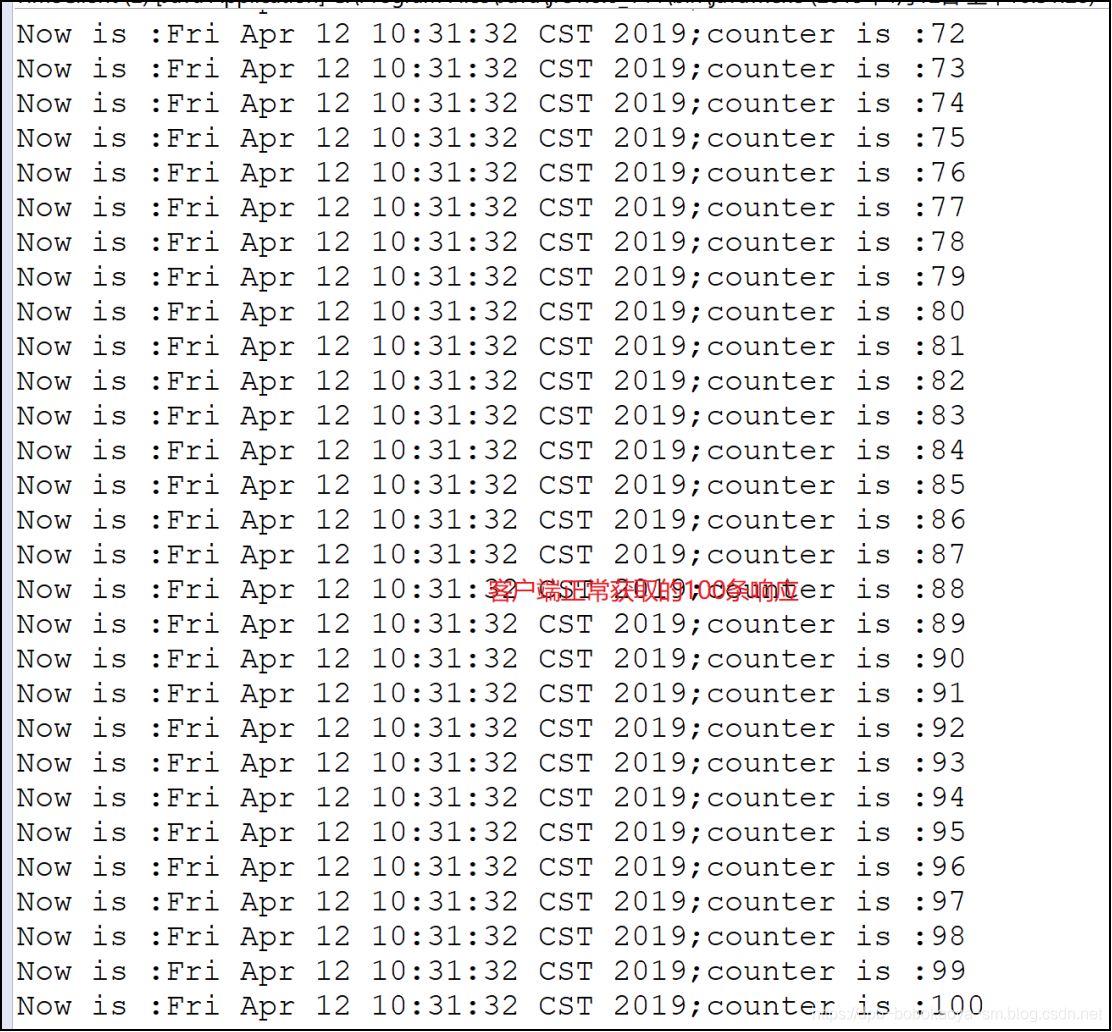
程序的运行结果完全符合我们的预期,说明通过LineBasedFrameDecoder和StringDecoder成功解决了TCP粘包导致的读半包问题,对于使用者来说,只要将支持半包解码的Handler添加到ChannelPiPeline中即可,不需要额外的代码,用户使用起来非常简单。
LineBasedFrameDecoder和StringDecoder的原理
的工作原理是依次遍历ByteBuf中的可读字节,判断看是否有"\n"或者"\r\n",如果有就以此位置为结束位置,从可读索引到结束位置区间的字节就组成了一行,它是以换行符为结束标志的解码器,StringDecoder的功能非常简单,就是将接收到的对象转换成字符串,然后继续调用后面的Handler, LineBasedFrameDecoder + StringDecoder组合就是按行切换的文本解码器,它被设计用来支持TCP的粘包和拆包问题。











